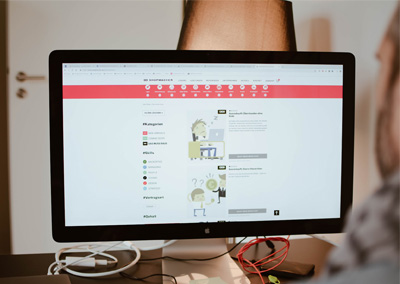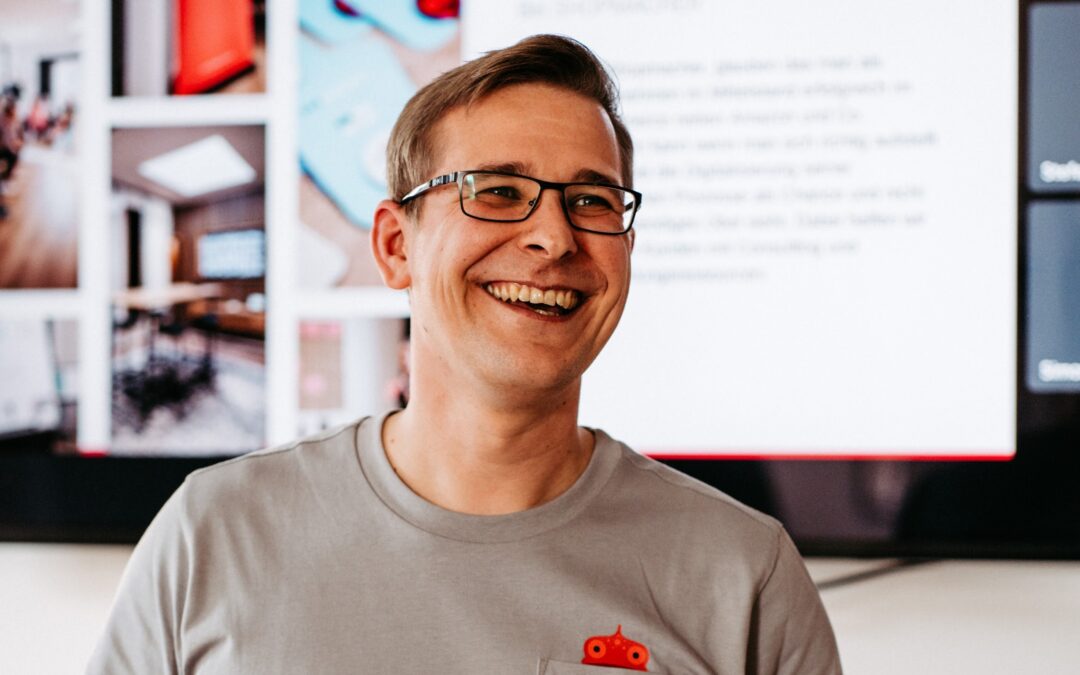In focus: THANKS FOR 15 YEARS OF SHOPMACHER
How Jenny went from project rescuer to Team Leader
You completed your training at SHOPMACHER and then took off as a project manager. What motivated you back then to dive into this role?
Jenny: During my training, I was thrown into the deep end early on and had to learn to work independently. I realized that project management suited me, and I was good at it. The transition into this role felt natural. It wasn’t so much a conscious decision as it was a development that emerged from my skills and enjoyment of the work. The variety of tasks, client interaction, appreciation, and teamwork—all of that motivated and fulfilled me.
What training did you complete, and how did it influence your career path?
Jenny: I completed an apprenticeship as a management assistant in marketing communications. I’ve always been drawn to communication and advertising, so I started my training at an advertising agency. Even though the agency later rebranded and specialized, I’m glad I followed that path. It was a conscious decision to focus on this specific area, and I’ve never regretted it.

What achievements stand out in your memory?
Jenny: It’s not about individual achievements for me, but rather the combination of teamwork, client relationships, and the right amount of pressure. I especially remember projects where we overcame seemingly impossible situations and brought nearly failed projects back to life. The collective effort and the feeling of achieving something together are what really matter.
You’ve grown from project management to team leadership. What new responsibilities have challenged you the most?
Jenny: The biggest difference is learning to let go and trust the team. Before, I had control over everything, but now I’m responsible for the people doing the operational work. This requires a shift in perspective: instead of focusing on client problems, I now address the needs and concerns of my employees. It’s important to remain authentic and grounded in this role.
How has your perspective about the company changed since moving into management?
Jenny: When I was in the middle of the day-to-day business, I was often critical and tended to focus on the negatives. Now, with a bit of distance, I realize how well we are positioned compared to others. We’re doing a lot of things right, especially in areas like employee development and employer branding. The quality of our work is excellent, too. I used to think that management was oblivious to problems. Today, I know they are very much aware but trust their employees and support them. Overall, my perspective has shifted from “everything is terrible” to “we’re actually doing great.” We should be more aware of how strong we are and celebrate that more often.
You left SHOPMACHER for six months to work client-side. What were your key takeaways from that experience, and why did you come back?
Jenny: Those six months really helped me clarify what I want from my work environment. I learned a lot about company culture—how crucial interpersonal relationships and transparent communication are. I realized that a medium-sized, family-run business with slow decision-making, little agility, and outdated hierarchies isn’t where I see myself. I left SHOPMACHER on good terms because I just wanted to experience something different. But I quickly found that I don’t like not knowing how to fill my day. And when critical issues like digitalization depend on a single person, that’s just not for me. So, I came back because here, I have the freedom and opportunity to drive things forward and shape the future.
What does a good company culture mean to you?
Jenny: For me, psychological safety and opportunities for growth are key elements of a good company culture. I want to feel safe showing vulnerability or discussing overwhelming situations without being judged. At the same time, I need to be able to develop in areas that interest me and where I can take the lead. Also, work should be fun. A relaxed atmosphere with colleagues, where you can sometimes be a bit cheeky, adds to that. Authenticity is another crucial pillar. I want to stay true to myself and not be forced into a role that doesn’t suit my personality.
What values are important to you in your leadership style?
Jenny: Authenticity, honesty, commitment, and reliability are the most important values for me. I aim for open and honest communication on an equal footing, where everyone can depend on each other. New employees should identify with our company culture and understand what’s important here: authenticity over superficiality. I lead by example, showing up as I am—even on bad days. My team always knows where they stand with me.
You’re now working part-time as a team leader. How has that affected your working style?
Jenny: My basic working style hasn’t changed: I’m still very structured and organized. What has changed is the need to prioritize more. With fewer working hours, I have to make sure I’m focusing on the right things. That sometimes means putting my own projects on the back burner and focusing on the team’s needs. The biggest challenge is fitting everything into 30 hours and setting the right priorities. One important realization for me was that when the workday ends, it really ends. This was especially tough in the beginning when I was still working part-time as an account lead. It’s a learning process to consciously switch off and focus on other things, even when colleagues are still working and might need something. I’ve learned it’s important to be strict with yourself and take care of your own well-being. Being always available and lacking clear focus is unsustainable in the long run and negatively impacts mental health.
AUCH INTERESSANT

10 Pitfalls when transitioning to composable commerce
We highlight the ten most common challenges that companies can face when introducing composable commerce. From the integration of different systems to issues of cost control and data management – a critical look at the pitfalls of this innovative technology.

Feedback culture – seven practical tips
Here are Patrick's seven practical tips:Patrick Blom, Operative Technical Consultant, a SHOPMACHER for 12 years.1. exemplify feedback from aboveManagers should actively give feedback and be open to feedback themselves. When managers value feedback, employees do too....

Say what you mean – and do what you say
"New Work" is one of the most frequently heard buzzwords in the course of work in times of digital change. "New Work" is actually not that new: At its core, it is about seeing the employee as a person with all their worries, needs and living conditions - and taking...